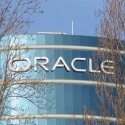
Oracle approaches the 5G core network market with two distinct stories to tell. The first is about how the company leveraged its 2013 purchase of Tekelec to become a top provider of signalling and policy control solutions in LTE cores. For now this is the story that's driving most 5G customer engagements.
"We've won a major North American operator with one of our 5G network elements and we're going to be winning another one," said John Lenns, Oracle's VP of product management for signalling solutions. "In Europe we're getting close; we've won one already and we're about ready to win another." The one 5G customer Oracle has announced publicly is KT.
The second story is about Oracle's dominant position in the world of enterprise software. It's significant because carriers are expected to sell customized 5G network services to enterprises. Lenns, who came to Oracle from Tekelec, said Oracle co-founder Larry Ellison knew in 2013 that his company was heading for the cloud, and wanted to migrate telecom software along with business vertical applications. Lenns said the goal is to offer service providers "an end-to-end cloud-based solution, with or without edge."
This summer Oracle said it will start selling 5G core network services to operators, hosted in the Oracle cloud and available as a subscription service. Other vendors are heading in the same direction, including Microsoft and HPE.
End-to-end, cloud-based 5G as-a-service is a big opportunity for Oracle, Lenns said, but it's not the only way the company will sell 5G core components. Oracle is also licensing its 5G network functions to operators that want to deploy in their own data centers, and that model has driven its customer wins to date.
Lenns said the carriers that are deploying 5G core networks at this time want to combine "best of breed" solutions from various vendors, so interoperability is key. "You know the CSP [communication service provider] is going to pick your competitors for other components, so you have to be interoperable with them," he said.
Down the road, Lenns expects to see the next wave of 5G core deployments focusing on more turnkey solutions instead of elements assembled from different vendors. Oracle is talking to potential partners, vendors that can offer the core network elements Oracle doesn't. The goal is to offer carriers a single solution, as traditional network equipment vendors like Nokia, Ericsson and Huawei do in LTE networks.
5G at the edge
"Oracle recognizes the need to deliver not just an Oracle public cloud but cloud to customers," Lenns said. "Sometimes for cost or technology reasons you do things on customer premise." He said Oracle's cloud infrastructure edge network can be globally distributed and will support applications and services that are designed to work at the edge, leveraging local compute devices as well as the public cloud domain.
Lenns foresees operators packaging a network slice with one or more of the dozens of applications that Oracle markets to multiple industries. He said there are many scenarios that might require such an application to reside at the customer's location, including latency requirements and data privacy concerns.
For now, most operators seem less focused on creating network slices for enterprise customers than on rolling out 5G to consumers. Lenns said his team sees requests for proposals (RFPs) for 5G core network functions that will serve consumers, but some of the RFPs include appendices that ask about private enterprise networks offered as a service. He predicts that those types of inquiries will soon move into the spotlight, and that some carriers will devote more of their 5G investment to enterprise customers. "That's the high margin business for the CSPs and network slicing is very applicable," he said.
Carriers may not use the same 5G core networks for enterprise and consumer networks, according to analyst Caroline Chappell, research director at Analysys Mason. "A lot of operators are thinking about having different cores for their consumer business and this new sort of enterprise IoT-related opportunity," she said.
Private networks
Oracle is paying close attention to the private wireless network opportunity and is keeping an eye on spectrum auctions and allocations that could put spectrum into the hands of private enterprises.
"What happens with these dedicated spectrums and what the big enterprises will do – everybody's watching," said Lenns. "We haven't announced anything regarding going directly to enterprises for this offering... Technically there wouldn't be anything stopping that."
But for now, Lenns said his group wants to focus on its traditional customer base: the service providers. "Make no mistake – we want to empower the CSPs to be successful selling to customers," he said. "There is a huge business to be had by making the CSPs successful."
Sizing up the competition
As a core network vendor, Oracle has been competing for years with Nokia and Ericsson, as well as some smaller companies that sell signalling and policy control solutions. Now, as the software giant moves toward cloud-based 5G as-a-service, it will be competing against some of the world's largest companies. "All the cloud providers see this as a space to go after – all the major cloud providers are our competitors," said Lenns. "We think Oracle's cloud offering is differentiated with our analytics and our database. But this is going to be a tough road."
Oracle has two other advantages over the major cloud providers: years of background in carrier core networks, and a suite of business software applications that can add value to its telecom software offerings. Lenns said one missing element is a radio access network solution.
"One area where partners could be important is in the RAN, the private RAN space," he said. "Whether that's a partner or eventual acquisition is still kind of TBD."
Oracle has acquired at least 52 companies in the last eight years, and as Lenns knows from personal experience, the company's acquisition choices can indicate what may lie ahead for the industry.
— Martha DeGrasse, special to Light Reading. Follow her @mardegrasse.
About the Author(s)
You May Also Like












